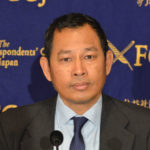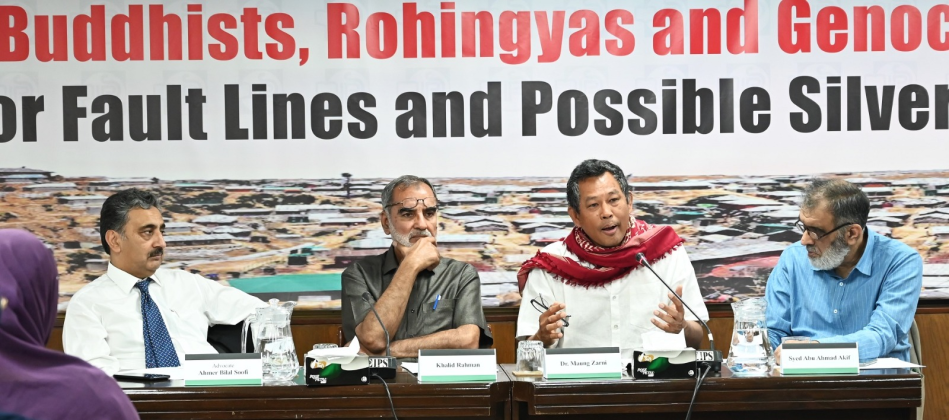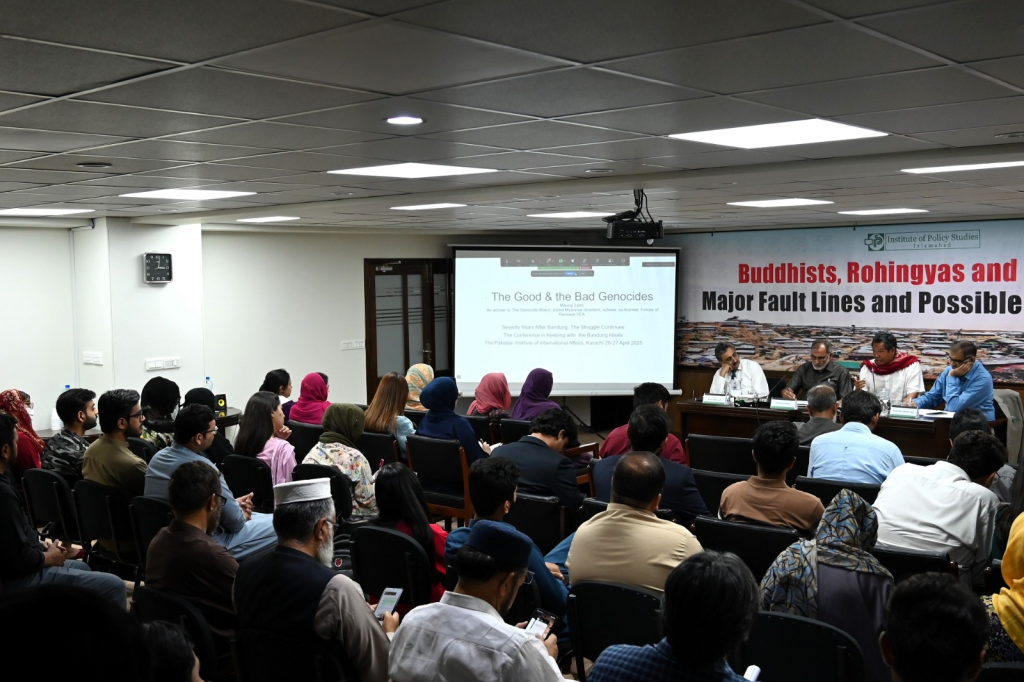Rohingya Genocide a Test of International Moral and Legal Commitment
TRANSCEND MEMBERS, 5 May 2025
Islamabad Daily Post - TRANSCEND Media Service
Pak, Myanmar Experts Raise Concerns
1 May 2025 – The genocide of the Rohingya in Myanmar is a systematic campaign rooted in Buddhist chauvinism, mono-ethnic nationalism, and the denial of Rohingya identity. Addressing atrocities of this scale requires moral courage, strong legal mechanisms, and a unified global response. As such, it represents a critical test of the international community’s moral and legal resolve. Justice can only be achieved through sustained international pressure, comprehensive documentation, and inclusive political reforms.
This was observed at a seminar titled “Buddhists, Rohingyas, and Genocide: Major Fault Lines and Possible Silver Linings,” hosted by the Institute of Policy Studies (IPS), Islamabad. The speakers included Myanmar-born scholar and rights activist Dr Zarni as the keynote speaker, Ahmer Bilal Soofi, senior advocate and founding president of the Research Society of International Law, Syed Abu Ahmad Akif, former federal secretary, and Khalid Rahman, chairman IPS.
Dr Zarni described the primary fault line behind the genocide as the deeply embedded Buddhist chauvinism in Myanmar, where Buddhists dominate state institutions and deny respect and fundamental rights to religious minorities. The Rohingya identity is denied domestically but protected under international law, he stated, adding that the 1982 Citizenship Law effectively rendered the Rohingya stateless.
He recounted the 2017 military campaign, in which more than 300 Rohingya villages were razed in just three months through organized arson, indiscriminate killings, and mass rapes, acts supported by the predominantly Buddhist population. As a result, hundreds of thousands of Rohingya sought refuge in other countries, especially Bangladesh.
He also criticized the silence of Myanmar’s intellectuals, media, and educated classes, noting that many knowingly supported the military’s actions. “Genocide is not spontaneous. It is planned, and what matters is how societies act on what they know,” he said.
Dr Zarni likened the ideological underpinnings of the Rohingya genocide to Hindutva in India and Zionism in Israel, where violence is framed as self-defense against imagined threats to national or religious identity.
Ahmer Soofi emphasized that religion should remain a matter of individual choice and that the right to practice any faith must be safeguarded under domestic and international law. Drawing on Islamic principles and Pakistan’s Constitution, he stressed that Islam mandates the protection of all human lives, regardless of religious affiliation. He noted that this principle aligns closely with Article 2 of the UN Convention on the Prevention and Punishment of the Crime of Genocide.
Citing that documentation by a UN investigation commission led to convictions after the Bosnian genocide, Soofi underscored the need for a dispassionate and objective documentation strategy to build a legal case for the Rohingya at various levels.
Khalid Rahman highlighted that the selective application of international law undermines its credibility and perpetuates cycles of violence. He said that human rights violations are no longer confined to specific regions, and selective advocacy only fuels further oppression. He cited the situations in Palestine and Indian-occupied Kashmir as parallels to the plight of the Rohingya.
The discussion also highlighted some emerging signs of hope. Dr Zarni pointed out that Myanmar’s military, though still the primary perpetrator of atrocities, has weakened and recently expressed willingness to repatriate some 180,000 Rohingya refugees from Bangladesh. Moreover, despite a general rollback of US foreign aid under the Trump administration, Rohingya aid was exempted, indicating some measure of international concern.
___________________________________________
 A Buddhist humanist from Burma (Myanmar), Maung Zarni, nominated for the 2024 Nobel Peace Prize, is a member of the TRANSCEND Network for Peace Development Environment, former Visiting Lecturer with Harvard Medical School, specializing in racism and violence in Burma and Sri Lanka, and Non-resident Scholar in Genocide Studies with Documentation Center – Cambodia. Zarni is the co-founder of FORSEA, a grass-roots organization of Southeast Asian human rights defenders, coordinator for Strategic Affairs for Free Rohingya Coalition, and an adviser to the European Centre for the Study of Extremism, Cambridge. Zarni holds a PhD (U Wisconsin at Madison) and a MA (U California), and has held various teaching, research and visiting fellowships at the universities in Asia, Europe and USA including Oxford, LSE, UCL Institute of Education, National-Louis, Malaya, and Brunei. He is the recipient of the “Cultivation of Harmony” award from the Parliament of the World’s Religions (2015). His analyses have appeared in leading newspapers including the New York Times, The Guardian and the Times. Among his academic publications on Rohingya genocide are The Slow-Burning Genocide of Myanmar’s Rohingyas (Pacific Rim Law and Policy Journal), An Evolution of Rohingya Persecution in Myanmar: From Strategic Embrace to Genocide, (Middle East Institute, American University), and Myanmar’s State-directed Persecution of Rohingyas and Other Muslims (Brown World Affairs Journal). He co-authored, with Natalie Brinham, Essays on Myanmar Genocide.
A Buddhist humanist from Burma (Myanmar), Maung Zarni, nominated for the 2024 Nobel Peace Prize, is a member of the TRANSCEND Network for Peace Development Environment, former Visiting Lecturer with Harvard Medical School, specializing in racism and violence in Burma and Sri Lanka, and Non-resident Scholar in Genocide Studies with Documentation Center – Cambodia. Zarni is the co-founder of FORSEA, a grass-roots organization of Southeast Asian human rights defenders, coordinator for Strategic Affairs for Free Rohingya Coalition, and an adviser to the European Centre for the Study of Extremism, Cambridge. Zarni holds a PhD (U Wisconsin at Madison) and a MA (U California), and has held various teaching, research and visiting fellowships at the universities in Asia, Europe and USA including Oxford, LSE, UCL Institute of Education, National-Louis, Malaya, and Brunei. He is the recipient of the “Cultivation of Harmony” award from the Parliament of the World’s Religions (2015). His analyses have appeared in leading newspapers including the New York Times, The Guardian and the Times. Among his academic publications on Rohingya genocide are The Slow-Burning Genocide of Myanmar’s Rohingyas (Pacific Rim Law and Policy Journal), An Evolution of Rohingya Persecution in Myanmar: From Strategic Embrace to Genocide, (Middle East Institute, American University), and Myanmar’s State-directed Persecution of Rohingyas and Other Muslims (Brown World Affairs Journal). He co-authored, with Natalie Brinham, Essays on Myanmar Genocide.
Go to Original – islamabadpost.com.pk
Tags: Burma/Myanmar, Genocide, Maung Zarni, Pakistan, Rohingya
DISCLAIMER: The statements, views and opinions expressed in pieces republished here are solely those of the authors and do not necessarily represent those of TMS. In accordance with title 17 U.S.C. section 107, this material is distributed without profit to those who have expressed a prior interest in receiving the included information for research and educational purposes. TMS has no affiliation whatsoever with the originator of this article nor is TMS endorsed or sponsored by the originator. “GO TO ORIGINAL” links are provided as a convenience to our readers and allow for verification of authenticity. However, as originating pages are often updated by their originating host sites, the versions posted may not match the versions our readers view when clicking the “GO TO ORIGINAL” links. This site contains copyrighted material the use of which has not always been specifically authorized by the copyright owner. We are making such material available in our efforts to advance understanding of environmental, political, human rights, economic, democracy, scientific, and social justice issues, etc. We believe this constitutes a ‘fair use’ of any such copyrighted material as provided for in section 107 of the US Copyright Law. In accordance with Title 17 U.S.C. Section 107, the material on this site is distributed without profit to those who have expressed a prior interest in receiving the included information for research and educational purposes. For more information go to: http://www.law.cornell.edu/uscode/17/107.shtml. If you wish to use copyrighted material from this site for purposes of your own that go beyond ‘fair use’, you must obtain permission from the copyright owner.
Join the discussion!
We welcome debate and dissent, but personal — ad hominem — attacks (on authors, other users or any individual), abuse and defamatory language will not be tolerated. Nor will we tolerate attempts to deliberately disrupt discussions. We aim to maintain an inviting space to focus on intelligent interactions and debates.

